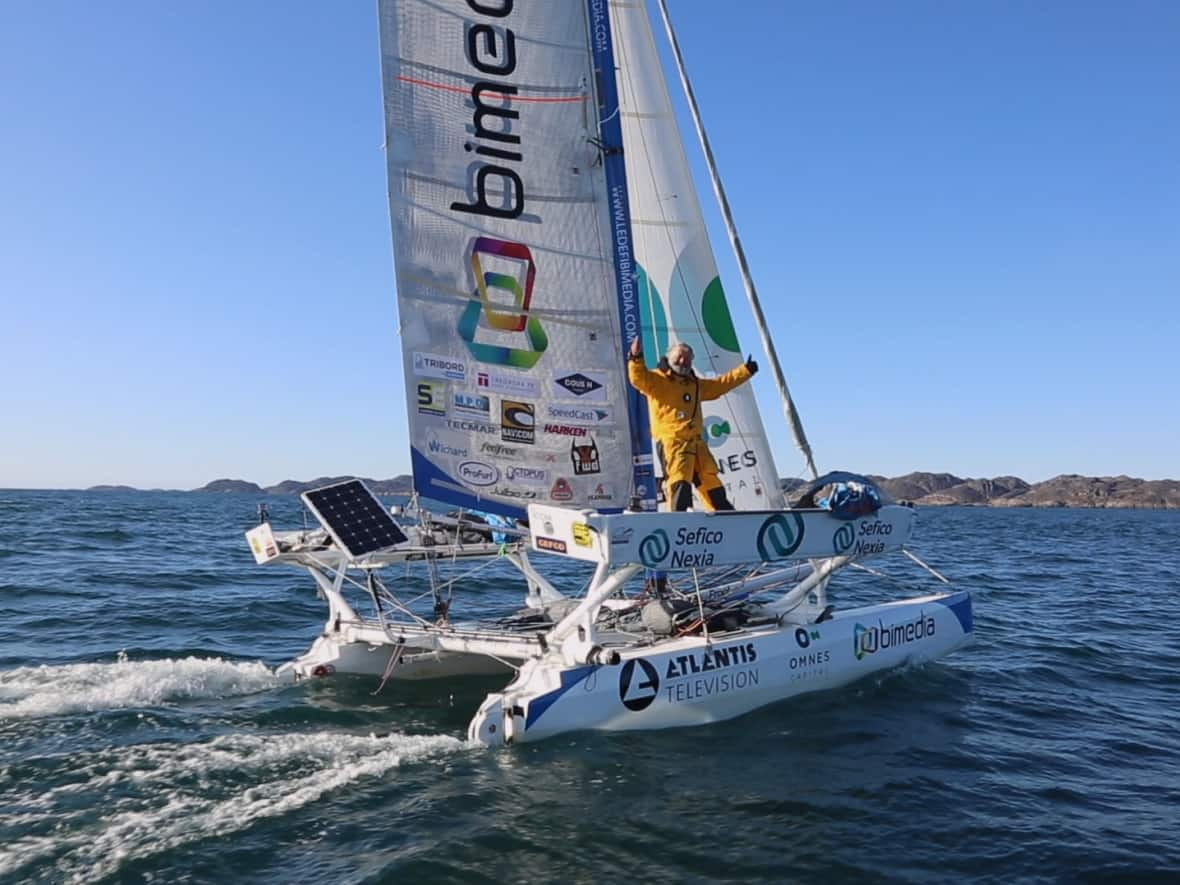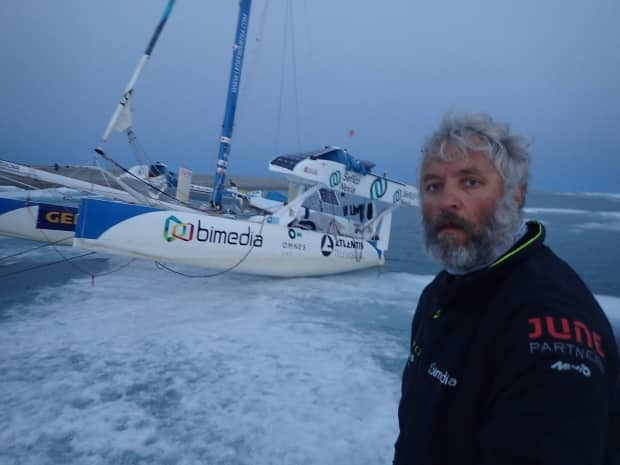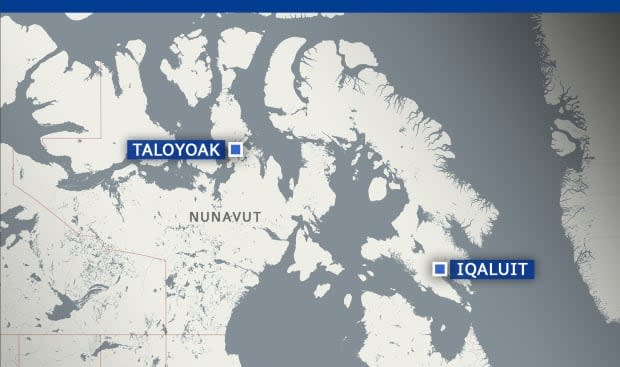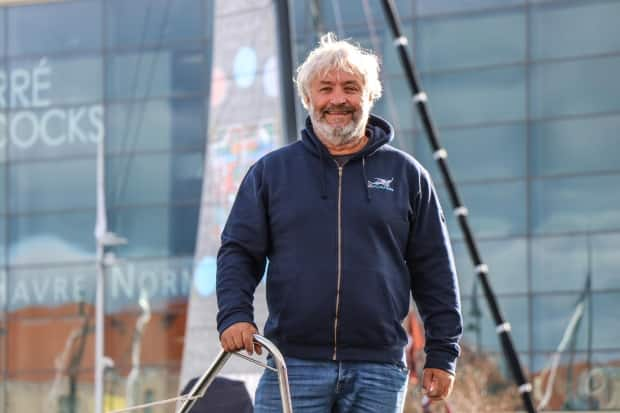French sailor pushes back at doubters of his Northwest Passage exploits

The man at the centre of a Northwest Passage controversy says he isn't a cheat or a liar — and he never claimed to have set a record with his 2017 solo crossing in a catamaran.
Yvan Bourgnon of France says he's shocked by accusations circulating in French media that he embellished the facts of his crossing, cheated on a record attempt and then tried to cover it up.
Sure, he tried to make the story come alive for those he told it to, said Bourgnon — who wouldn't, after navigating 7,500 kilometres of treacherous Arctic waters in a boat with no cabin?
"Isn't that what every adventurer does when he describes his journey?" Bourgnon said in a written response to the accusations.
"Telling, making the story come alive to share it, giving it meaning, making people feel the moment — this is the very nature of adventure storytelling and in no case does it deserve to be accused of cheating or lying."
At the heart of this odd controversy are headlines and articles in French newspapers that conflate two subjects: a lawsuit that's currently before the French courts, and accusations that he fabricated or lied about aspects of his trip.
A meeting in Taloyoak
Bourgnon spent 71 days at sea aboard his catamaran, Ma Louloutte, starting in July 2017.
On his website, the skipper compiles a list of highlights from the trip: falling overboard at Prudhoe Bay, colliding with a walrus after Bellot Strait, and finding a polar bear with its paws on Ma Louloutte's deck near Qikiqtarjuaq, Nunavut.

On Sept. 26, 2022, the French daily Le Figaro published an investigation casting doubt on some of those claims. The investigation questioned Bourgnon's polar bear encounter, pointing to the absence of scratch marks on the catamaran, and questioned why the onboard cameras that were being used for a documentary all went down at Bellot Strait (which Bourgnon says was due to the difficulty of charging batteries on board).
It also resurrected claims Bourgnon had lied about setting a formal record for the first solo crossing in a cabinless catamaran, which would have required him to sail the route unaided without setting foot on land.
It points to time he spent in Taloyoak, Nunavut, and help he apparently received from some other sailors, accusing him of trying to hide both facts so he could claim to have made history as the first person to sail the Northwest Passage solo in a catamaran.
It cites an email where Bourgnon apparently asked Pierre Guyot — the documentary film producer now suing him — to be discreet about a meeting they had in Taloyoak where Bourgnon spent several days.
In an interview, Bourgnon told CBC he never tried to hide the fact he stayed in Taloyoak. He wrote openly about it in his 2018 memoir, Conquerant des glaces, where he described sleeping in a "hut" for four nights.
Despite having given an interview to Radio-Canada in September 2017 where he described his journey as an attempt to set a record, Bourgnon told CBC the record in question was just a dream — one that he knew had failed when he stopped in Taloyoak.

Because of that, he never asked for the record to be certified, he said.
"I said, 'OK, I put my feet on the land, so I didn't respect the things to make a record,'" Bourgnon said.
"For me, it was not the main thing. The main thing was to do an adventure, to do a challenge, to be alone with a small beach catamaran there."
However, his website describes him as "the first skipper to achieve the Northwest Passage on a single-handed sport catamaran, without cockpit or assistance," and so does the website for the Bimedia Challenge — which is the challenge he had undertaken.
Chuck Pizzo-Lyall, the mayor of Taloyoak, remembers meeting Bourgnon and Guyot when they stopped there in August 2017. He said Bourgnon spent about a week in the community.
There's a little secluded bay nearby, where boats can take shelter from big winds and waves. Pizzo-Lyall said he helped tow them into that safe harbour, and later gave Bourgnon a tow back out.
"We watched him take off into the horizon," he recalled.
Pizzo-Lyall said he thought Bourgnon's journey was a "very amazing feat."
"I'm really glad he made it … Doing it alone has its own mental health challenges, especially if you're facing the North — whether it's the weather or mental wellbeing of being alone out there, polar bears and all this wildlife we have in the North that's basically bigger and can eat you no problem," he said.

The lawsuit
Bourgnon faces a lawsuit in relation to his Northwest Passage crossing — essentially, a fight over who owns the rights to images filmed during his journey for use in a documentary, he said.
That case was heard by Paris's intellectual property court on Oct. 6, and a decision is expected on Dec. 6.
Pierre Guyot — who Bourgnon says was a longtime friend before they had a falling-out — and French production company 10-7 Productions are suing Bourgnon for 280,000 euros (nearly $380,000 CAD).
Reached in Paris, Jean Aittouares, one of Guyot's lawyers, told CBC that Bourgnon had tried to get Guyot to hide some of the aspects of the trip — such as that fateful stopover in Taloyoak that disqualified Bourgnon from setting a record. Guyot didn't want to lie, and the resulting conflict between them stopped Guyot from making his documentary, Aittouares said — then, without credit or permission, Bourgnon used the images from the trip for his own profit.
"He trampled on the work of Guyot at the start, ousted him to punish him for his integrity, then violated his rights by exploiting the documentary for his personal needs and to derive personal income from it," Aittouares said in French.
"Then he implicated Guyot in what had already cost him his participation in the film by making him endorse the lie he had made."
Bourgnon said the courts are only deciding on the issue of rights, not ruling on any of the other accusations.
The passage
The Northwest Passage is a notoriously difficult journey. This year, two Brazilian sailors tried the feat in a catamaran but had to turn back before they finished, citing the shifting season and bad weather.
The first successful sail-powered crossing, which began in 1986 and spanned three summers, documented the dangers of the trip as well. Sailor Jeff MacInnis wrote of bears, blizzards and 15-foot waves in his memoir, Polar Passage.
And of course, the famous 19th-century Arctic expedition of John Franklin trying to discover the Northwest Passage ended with the deaths of him and his crew, and still fuels the imaginations of explorers today.
Sailors regularly put in at Nunavut's communities along the way. In September, a Texan sailor who had hoped to do part of the Northwest Passage had to seek help from residents in Kugluktuk after his boat cracked.
Bourgnon said his journey and stopover in Taloyoak gave him the chance to meet and speak with Inuit and discuss his great passion: the ocean. Those talks gave him perspective, he said, for his ecological work with The SeaCleaners, which works to protect oceans from plastic pollution.
"I had a very good experience" he said. "It was very interesting to talk with them and to understand what is happening."
As for Chuck Pizzo-Lyall, Taloyoak's mayor, he said he welcomes the interest of navigators in the area, but admits the recent increase in maritime traffic worries him.
"Trying to rescue someone by boat who is 200 miles from our community can be very complicated," he said. "The weather fluctuates wildly here."


